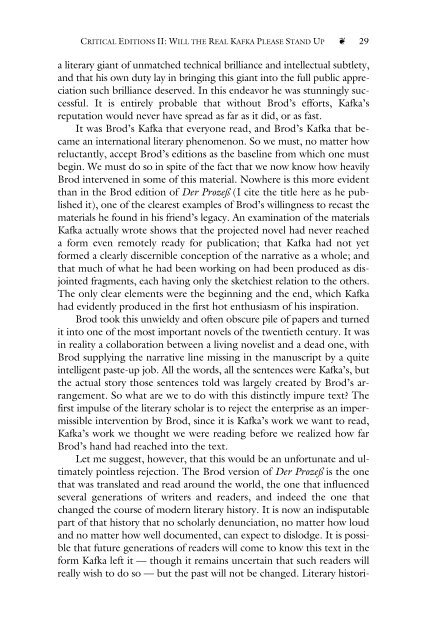Companion to the Works of Franz Kafka.pdf - tywls12ela
Companion to the Works of Franz Kafka.pdf - tywls12ela
Companion to the Works of Franz Kafka.pdf - tywls12ela
Create successful ePaper yourself
Turn your PDF publications into a flip-book with our unique Google optimized e-Paper software.
CRITICAL EDITIONS II: WILL THE REAL KAFKA PLEASE STAND UP u 29<br />
a literary giant <strong>of</strong> unmatched technical brilliance and intellectual subtlety,<br />
and that his own duty lay in bringing this giant in<strong>to</strong> <strong>the</strong> full public appreciation<br />
such brilliance deserved. In this endeavor he was stunningly successful.<br />
It is entirely probable that without Brod’s efforts, <strong>Kafka</strong>’s<br />
reputation would never have spread as far as it did, or as fast.<br />
It was Brod’s <strong>Kafka</strong> that everyone read, and Brod’s <strong>Kafka</strong> that became<br />
an international literary phenomenon. So we must, no matter how<br />
reluctantly, accept Brod’s editions as <strong>the</strong> baseline from which one must<br />
begin. We must do so in spite <strong>of</strong> <strong>the</strong> fact that we now know how heavily<br />
Brod intervened in some <strong>of</strong> this material. Nowhere is this more evident<br />
than in <strong>the</strong> Brod edition <strong>of</strong> Der Prozeß (I cite <strong>the</strong> title here as he published<br />
it), one <strong>of</strong> <strong>the</strong> clearest examples <strong>of</strong> Brod’s willingness <strong>to</strong> recast <strong>the</strong><br />
materials he found in his friend’s legacy. An examination <strong>of</strong> <strong>the</strong> materials<br />
<strong>Kafka</strong> actually wrote shows that <strong>the</strong> projected novel had never reached<br />
a form even remotely ready for publication; that <strong>Kafka</strong> had not yet<br />
formed a clearly discernible conception <strong>of</strong> <strong>the</strong> narrative as a whole; and<br />
that much <strong>of</strong> what he had been working on had been produced as disjointed<br />
fragments, each having only <strong>the</strong> sketchiest relation <strong>to</strong> <strong>the</strong> o<strong>the</strong>rs.<br />
The only clear elements were <strong>the</strong> beginning and <strong>the</strong> end, which <strong>Kafka</strong><br />
had evidently produced in <strong>the</strong> first hot enthusiasm <strong>of</strong> his inspiration.<br />
Brod <strong>to</strong>ok this unwieldy and <strong>of</strong>ten obscure pile <strong>of</strong> papers and turned<br />
it in<strong>to</strong> one <strong>of</strong> <strong>the</strong> most important novels <strong>of</strong> <strong>the</strong> twentieth century. It was<br />
in reality a collaboration between a living novelist and a dead one, with<br />
Brod supplying <strong>the</strong> narrative line missing in <strong>the</strong> manuscript by a quite<br />
intelligent paste-up job. All <strong>the</strong> words, all <strong>the</strong> sentences were <strong>Kafka</strong>’s, but<br />
<strong>the</strong> actual s<strong>to</strong>ry those sentences <strong>to</strong>ld was largely created by Brod’s arrangement.<br />
So what are we <strong>to</strong> do with this distinctly impure text? The<br />
first impulse <strong>of</strong> <strong>the</strong> literary scholar is <strong>to</strong> reject <strong>the</strong> enterprise as an impermissible<br />
intervention by Brod, since it is <strong>Kafka</strong>’s work we want <strong>to</strong> read,<br />
<strong>Kafka</strong>’s work we thought we were reading before we realized how far<br />
Brod’s hand had reached in<strong>to</strong> <strong>the</strong> text.<br />
Let me suggest, however, that this would be an unfortunate and ultimately<br />
pointless rejection. The Brod version <strong>of</strong> Der Prozeß is <strong>the</strong> one<br />
that was translated and read around <strong>the</strong> world, <strong>the</strong> one that influenced<br />
several generations <strong>of</strong> writers and readers, and indeed <strong>the</strong> one that<br />
changed <strong>the</strong> course <strong>of</strong> modern literary his<strong>to</strong>ry. It is now an indisputable<br />
part <strong>of</strong> that his<strong>to</strong>ry that no scholarly denunciation, no matter how loud<br />
and no matter how well documented, can expect <strong>to</strong> dislodge. It is possible<br />
that future generations <strong>of</strong> readers will come <strong>to</strong> know this text in <strong>the</strong><br />
form <strong>Kafka</strong> left it — though it remains uncertain that such readers will<br />
really wish <strong>to</strong> do so — but <strong>the</strong> past will not be changed. Literary his<strong>to</strong>ri-


